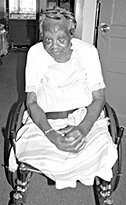Novella Buckley's house is a nondescript brick and asbestos shingle structure, tucked away on the corner of Woodrow Wilson and Morton Avenue, just knocking on the very edges of the Georgetown Community. The home itself could be no more than 60 years old, possibly one of the many homes thrown up when the boomer population exploded upon the return of combatants from World War II.
Portions of the structure are showing signs of decay as the owner no longer commands the mobility she once had. Unrecognizable clutter lines parts of the house's humble exterior, and portions of the building are falling way from the main structure.
The house itself is crammed with ancient furniture; it is hard to move about in the kitchen, which is stuffed with regular-sized appliances that are nevertheless poorly suited to such limited containment. There is certainly little room for a 90-year-old woman in a wheelchair.
Buckley's power has been out since Katrina roared through the area, carrying the pent-up anger of 150 years of steady global warming from the Industrial Age. Since that violence, she has been staring out of the burglar bars of her front door, locked in a virtual oven, drinking tainted water and eating rotten food.
"I didn't get no ice. I didn't get no water," Buckley says in a frail, mealy voice, scratched with age. "I just stayed in the door, and I had a (paper) fan. If I go outside I can't get back in. My legs is cut off up to my knees. Poor circulation. Diabetes."
"I got an electric wheelchair," she says, pointing back at a device made useless by dead outlets. "But I ain't had that for a few days."
Buckley did not have her electricity restored as late as Sunday, Sept 4. It wasn't until that same day that her part-time nurse, Josephine McGruder, walked into a house reeking of rotted meat and the rank stench of infection.
"That smell is all her old food in there that I put in a garbage bag," McGruder says, gesturing back to the kitchen. "I had to clean out her refrigerator and freezer because, oooh, it sure did stink."
Living in a community as big as the metro area of Jackson comes with many benefits. One of the obvious disadvantages, however, is a fractured sense of community. Ward 3 Councilman Kenneth Stokes witnessed firsthand how painfully easy it is to lose sight of a small, unobtrusive face in a virtual sea of bobbing heads. Such was the case for Buckley—who lives just across the street from him.
Shocked and shamed, Stokes invited the Jackson Free Press to the home of Buckley, visibly furious that her plight had gone undiscovered by even him.
"We just didn't know she was here. Everybody thought she'd left when the power went out," Stokes exclaims, already on the phone making arrangements to fetch fresh food and cold water for the tiny, irrepressible woman in hair rollers. "We didn't know. I never knew."
"Where'd you get your water?" McGruder demands of Buckley.
"What you say?"
"Where'd you get your water?" McGruder repeats loudly. "You been drinking out the faucet?"
"Yeah, I been drinkin' out the faucet. There wasn't nowhere else to get it," the invalid retorts. "I didn't know about people not supposing to be drinking the water. I've been drinking that hot water."
Complicating matters is the fact that Buckley's hearing has faded with age, making her telephone useless.
"I come here and work two hours a day, but nobody knew she was here," McGruder says. "Somehow she got lost in the system, and she was here all along. I just came by today. I called my boss, saying I was worried about her, and I came over, and she's been here by herself all this time."
McGruder says her boss at Heritage Home Health Agency had assumed Buckley had been evacuated from her powerless house when she didn't answer the phone.
Buckley claims she could never hear it ringing.
"My boss was calling her, but nobody would answer the phone, so I didn't think to come by, nobody came by. When I got in here, it was hot. She had one window cracked right there," the nurse says, gesturing to a single window next to a bed with an overhanging pulley by which the disabled haul themselves out of bed. "That's the only window she could get up."
The television cameras are focused on the gas lines and the devastation. Buckley, meanwhile, ranks among the many senior citizens who only register in the news as afterthoughts, or even as body bags after succumbing to thirst or exposure within the prison of their own houses. Citizens like Buckley have nobody. Her living relations are out of touch, so there are only paid part-timers, all of whom mistakenly assume that somebody else has already handled her.
It is likely that Buckley is not the only senior citizen held captive by her own walls, according to officials. Just as sure as there are invalids with no contacts, there are people who suffer alone.
"I don't even know how to give an approximation of how many people could be in that situation, but there could certainly be more of them out there," says Dr. Charles Guess, clinical coordinator of Information & Quality Healthcare of Mississippi, who is working with Red Cross in helping refugees at the Jackson Coliseum.
"I don't know what to do beyond putting out some public service announcement that people should check on anyone that they know are living alone, whether it's a neighbor or family member. Please—just knock on their door and check on them."


